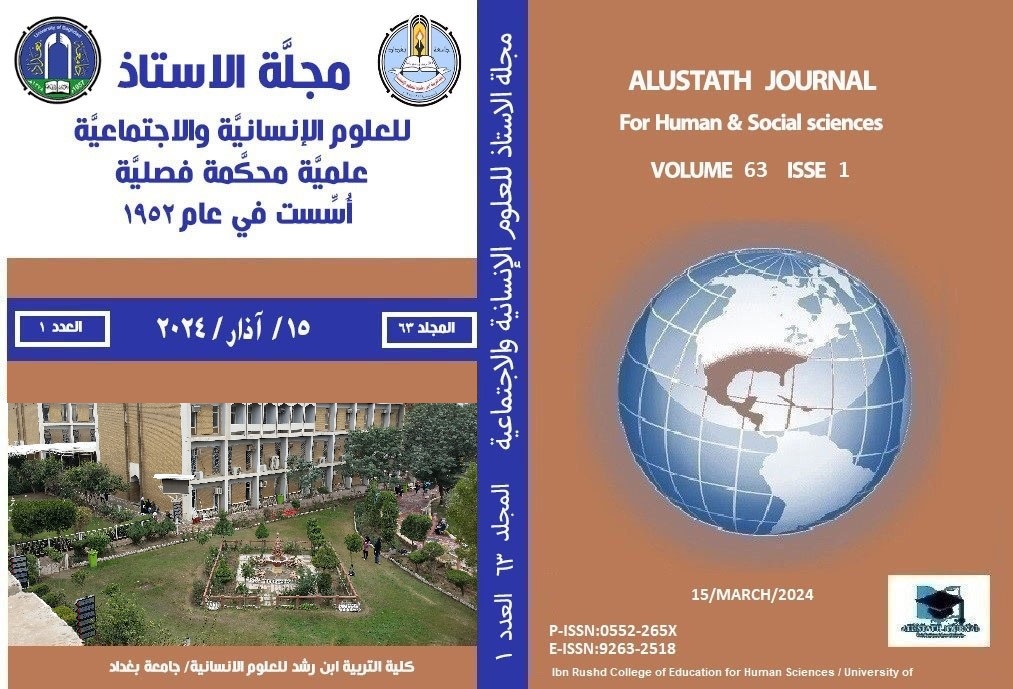بناء وتطبيق مقياس شخصية ذاتية الغرض لدى طلبة الجامعة
DOI:
https://doi.org/10.36473/ns4jwy19الكلمات المفتاحية:
بناء وتطبيق، مقياس، شخصية ذاتية الغرضالملخص
هدف البحث بناء وتطبيق مقياس الشخصية ذاتية الغرض لدى عينة من طلبة جامعة بغداد بلغ حجمها (500) طالب وطالبة ,منهم (205) طالب و(295 )طالبة ولغرض تحقيق اهداف البحث وضعت الباحثة تعريف نظريا لشخصية ذاتية الغرض وتم صياغة (42) موقف لفظي وامام كل موقف هناك ثلاث بدائل لفظية (أ, ب ,ج ) تم تصحيح المقياس (1,2,3 ) على التوالي لبدائل للا اجابه لكل موقف ولغرض التحقق منطقيا تم عرض فقرات المقياس على المحكمين والمتخصصين في العلوم التربوية والنفسية وتحقق من نسبة الاتفاق 80% بعد اجراء بعض التعديلات على بعض المواقف وتم الاخذ بها , كذلك تم احتساب الخصائص السيكو مترية لمواقف المقياس متمثلة بالكشف عن المؤشرات الاحصائية للمقياس والتعرف على اعتدالية التوزيع للدرجات ,وقامت الباحثة بأجراء التحليل العاملي الاستكشافي للكشف عن البنية العامليه وكذلك استخراج ارتباط الفقرة بالدرجة الكلية للمقياس وحساب القوة التميزية للفقرات المقياس حيث لم تكن هناك اي فقره غير مميزه وتم التحقق من صدق المقياس وثباته ,تم اتخاذ ذات العينة في اشتقاق معايير الرتب المئينيه للمقياس ,وتم التوصل الى الاستنتاجات والتوصيات والمقترحات .
التنزيلات
المراجع
Al-Basiouni, Abdul Rahman, (1985): Measurement and Experimentation in Psychology and Education, Alexandria, Dar Al-Ma’rifa University, Cairo, Egypt.
Al-Jarakh, Karar Hussein Abd Jawad, (2021): Self-goal personality and its relationship to the cognitive style (risk-taking - caution) among graduate students, unpublished master’s thesis, Al-Qadisiyah University, College of Arts.
Harb, Sameh Hassan Saad El-Din, (2022): Psychological variables associated with the self-purposed personality among university students, Educational Journal, vol. 2, (93), pp. 755-857.
Khalaf, Azhar Youssef, (2021): The Patient Personality among Samarra University Students, Center for Psychological Research, Volume (32), Issue (3), pp. 697-726.
Al-Sharqawi, Anwar Muhammad, Sheikh Suleiman Al-Khudari, Kazem, Omnia Muhammad, and Abdel Salam, Nadia Muhammad, (1996): Contemporary Trends in Psychological and Educational Measurement and Evaluation, Cairo, Anglo-Egyptian Library.
- Al-Sammadi, Abdullah, and Al-Darabie, Maher, (2004): Psychological and educational measurement and evaluation between theory and practice, 1st edition, Amman, Dar Wael for Publishing and Distribution.
Abbas, Muhammad Khalil, Muhammad Bakr Nofal, Muhammad Al-Qaisi, Faryal Muhammad, (2011): Research Methods in Education and Psychology, 3rd edition, Dar Al-Masirah for Publishing and Distribution, Amman - Jordan.
Abdul Rahman, Anwar Hussein, and Zanganah, Adnan Haqqi Shihab, (2008): Conceptual and theoretical foundations in the curricula of the humanities and applied sciences, 1st edition, Baghdad.
- Odeh, Ahmed Makkawi, Fathi Hassan, (1987): Fundamentals of Scientific Research in Education and Human Sciences, Al-Manar Library, Amman.
المصادر الأجنبية
Csikszentmihalyi, M. (1990): Flow. New York: Harper & Row.
Csikszentmihalyi, M. (1997) Finding Flow. The Psychology of engagement with everyday life. New York: Basic Books
Csikszentmihalyi, M. Rathunde, K., & Whalen, S., (1993). Talented teenagers: A longitudinal study of their development. New York: Cambridge University Press.
Deck & Ryan R. M. (1985) Intrinsicmbirvation and self-determination in E humanbehavior. Springer Science & Business Media.
Dwight CK. Tee, Vienne Wing Yen lau (2018): The Developrnent of the Autotelic ersonality Questionnaire, Article in Journal of Personality Assessment
Lüdtke (2018). Music-induced Flow Alters the Emotional Response to Environmental Scenes [Unpublished Master's Thesis]. Vienna University.
Nakamura J & Csikszentmihalyi, M., (2002): The concept of flow. Handbook of positive psychology, 89-105
Csikszentmihalyi, M. (1990). Flow: The psycholog of optimal experience. Harper Collins
Asawa, K., (2010) Flow experience, culture, and well-being: How do autotelic Japanese college students feel, behave, and think in their daily Srees? Journal of Happiness Studies, 11, 205-223.
Baumann, N. (2012). Autotelic Personality. In S. Engeser (Ed.), Advances in flow research (pp. 165-186). Springer. https://doi.org/10.1007/978-1- 4614-2359-1
Asakawa, K. (2010). Flow experience, culture, and well-being: How do autotelic Japanese college students feel, behave, and think in their daily lives. Journal of Happiness Studies, 11, 205-223. https://doi.org/10.1007/s10902-008-9132-3
Tse, D. C. K., Lau, V. W., Perlman, R., & McLaughlin, M. (2020). The development and validation of the autotelic personality questionnaire. Journal of Personality Assessment, 102(1), 88- 101. https://doi.org/10.1080/00223891.2018.1491855
Sidorová, D. (2015). Well-being, flow experience and personal characteristics of individuals who do extreme sports us serious leisure [Unpublished Doctoral Dissertation) Masaryk University.
Nakamura, J., & Csikszentmihalyi, M. (2014). The concept of flow. In M Csikszentmihalyi (Ed.), Flow and the Foundations of Positive Psychology: The Collected Works of Mihaly Csikszentmihalyi (pp. 239-263). Springer. https://doi.org/10.1007/978-94-017-9088-8_16
Gao May (2019): How Personality and Self-Perception Relate to Flow Propensity.
Asakawa, K. (2010). Flow experience, culture, and well-being: How do autotelic Japanese college students feel, behave, and think in their daily lives. Journal of Happiness Studies, 11, 205-223. https://doi.org/10.1007/s10902-008-9132-3
Yarar, O.F. (2015). Autotelic personality: Links with flow propensity, personal strengths, and psychopathology [Unpublished Doctoral Dissertation). The Middle East Technical University.
التنزيلات
منشور
إصدار
القسم
الرخصة
الحقوق الفكرية (c) 2024 هند صبيح رحيم

هذا العمل مرخص بموجب Creative Commons Attribution 4.0 International License.











